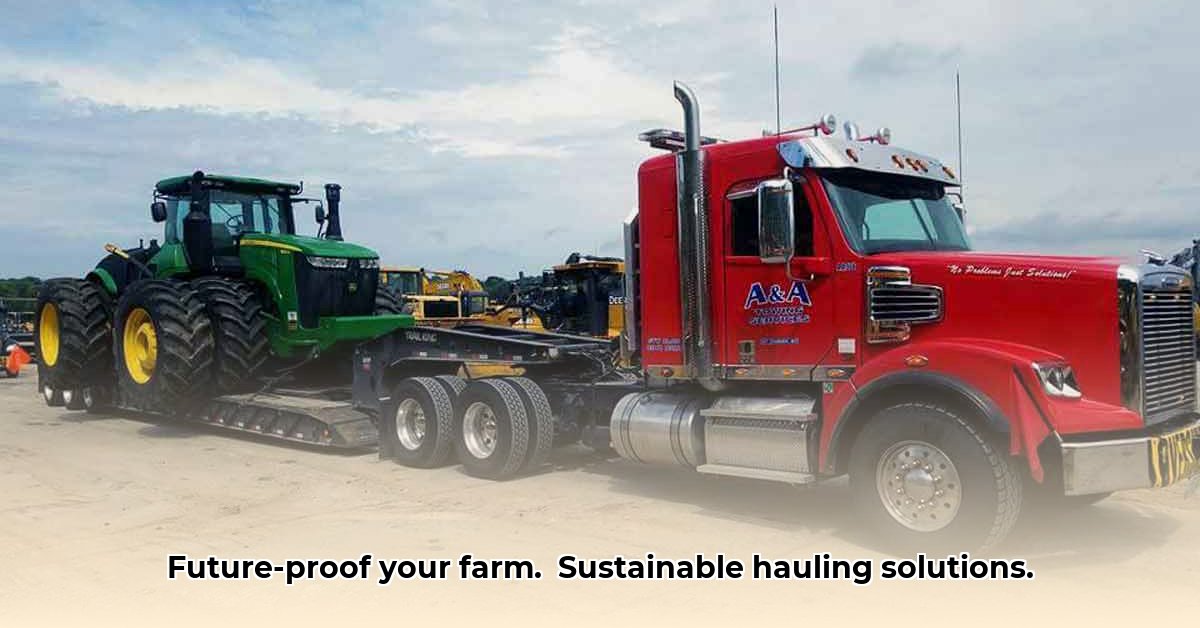
Tractor Hauling: A Modern Agricultural Necessity
Imagine a farmer in Iowa, needing a crucial piece of equipment – a state-of-the-art, 400-horsepower tractor – currently situated in Nebraska. Getting it across state lines safely and efficiently presents a significant logistical challenge, and one with substantial environmental implications. The seemingly simple act of tractor hauling significantly impacts the environmental footprint of modern agriculture. This article explores the current state of tractor transportation, the emerging sustainable practices revolutionizing this crucial sector, and the future of responsible tractor hauling. For more information on selecting the right tractor, check out this tractor buying guide.
The Current Landscape of Tractor Transportation
The tractor hauling market is a diverse landscape, comprised of large national carriers offering standardized services, and smaller, regional operators providing more personalized solutions. Major players often leverage sophisticated logistics networks, ensuring reliable, long-distance transport. However, these larger companies might lack the agility to accommodate specialized requests or prioritize sustainability initiatives. Smaller, local companies can offer tailored solutions, but their geographical reach is naturally more limited. The choice of hauler becomes a careful balancing act, weighing factors like cost, reliability, and increasingly, commitment to environmental stewardship.
Traditional tractor transportation relies heavily on diesel-powered trucks, resulting in considerable fuel consumption and greenhouse gas (GHG) emissions. Considering the average distance traveled and weight of the equipment, the environmental impact is significant. Is it possible to maintain agricultural efficiency without compromising environmental responsibility? The answer, increasingly, is a resounding yes.
Embracing Sustainable Practices: Green Initiatives in Tractor Transportation
The tractor hauling industry is responding to growing environmental concerns and the need for cost optimization by embracing several sustainable practices:
Alternative Fuels: The transition away from diesel is gaining momentum. Biodiesel, compressed natural gas (CNG), and even electric options for shorter distances are becoming more viable alternatives. While initial investment costs are higher, long-term fuel savings and reduced emissions offer a compelling return on investment. Technological advancements continue to improve the efficiency and viability of these alternatives.
Route Optimization Software: Advanced GPS-powered route planning software is revolutionizing efficiency. These intelligent systems minimize mileage, taking into consideration real-time traffic, road conditions, and even fuel prices. Smaller improvements in travel distance compound over time to significant reductions in fuel consumption and emissions.
Efficient Equipment Upgrading: Investing in fuel-efficient tractors and trailers is a key strategy. Newer models often feature improved aerodynamics, lighter-weight materials, and advanced engine technology, resulting in reduced fuel consumption per mile. This represents a long-term investment, but ultimately, a financially and environmentally sound one.
Carbon Offset Programs: While immediate emissions reduction may be difficult to achieve, carbon offsetting programs provide a complementary strategy. By investing in projects that actively reduce carbon emissions elsewhere, companies can neutralize some of their operational impact. This allows businesses to act decisively while transitioning to more sustainable practices.
Case Studies: Industry Pioneers in Sustainable Hauling
While comprehensive data on sustainable practices are still emerging, innovative companies are demonstrating the potential for change. Several hauling businesses are pilot-testing hybrid or fully electric trucks, particularly for shorter routes. Cooperative initiatives are also gaining traction. Collaboration between farmers and haulers enables strategies such as consolidated shipments, minimizing the number of trucks needed for multiple deliveries. Such collaborations highlight the power of partnerships in achieving greater sustainability.
Navigating Challenges and Opportunities: The Path Forward
The shift towards sustainable tractor hauling faces substantial challenges. The lack of standardized emissions tracking methods makes a cross-industry comparison of practices difficult. Regulatory inconsistencies across different jurisdictions complicate cross-border operations. The high upfront costs associated with cleaner fuel technologies can also be a barrier to entry for smaller companies.
However, the potential benefits are immense. Government incentives and an increasing demand for environmentally conscious practices are creating a positive feedback loop. Farmers who partner with environmentally responsible haulers benefit from enhanced brand reputation and the potential for a competitive advantage in a growing market that values sustainability.
Shaping the Future: A Collaborative Approach
The future of tractor hauling is intrinsically linked with the wider sustainability movement in agriculture. A future of efficient, environmentally responsible transport requires a coordinated effort from all stakeholders.
Actionable Steps for a Sustainable Future:
Hauling Companies: Conduct comprehensive carbon emissions assessments and explore alternative fuel options. Invest in state-of-the-art route optimization software and develop robust carbon offsetting programs.
Farmers: Inquire about the environmental practices of potential haulers. Prioritize companies with demonstrated commitments to sustainability and actively advocate for supportive regulation.
Policymakers: Implement financial incentives for sustainable transportation and develop stricter emissions standards. Invest in infrastructure to support the use of alternative fuels.
The transition to sustainable tractor hauling represents not merely an ethical imperative but also a forward-thinking business strategy. By embracing innovation and collaboration, the agriculture sector can meet the demands of a growing global population without compromising the health of the planet.